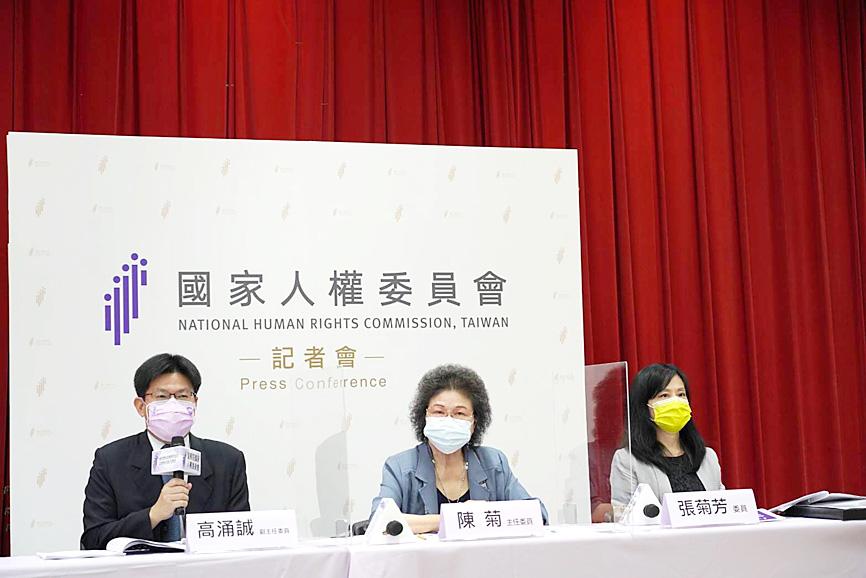The National Human Rights Commission (NHRC) yesterday released its first report, clearing pioneer democracy advocate and former Taipei City councilor Lin Shui-chuan (林水泉), who was imprisoned by the Chinese Nationalist Party (KMT).
Lin’s case was chosen for the commission’s first investigation, as it was among the most prominent cases of political persecution during the White Terror era, the NHRC said.
NHRC Chairwoman Chen Chu (陳菊) said Lin ran as an independent candidate for Taipei City councilor in 1960, but in 1961 the KMT branded him a “hoodlum,” and imprisoned him without due judicial process.

Photo courtesy of the National Human Rights Commission via CNA
Lin had the courage to criticize the KMT government for supressing people’s rights, Chen said. “What happened to Lin epitomized the many other cases of human rights abuse during the KMT’s authoritarian control of Taiwan.”
“The injustices and atrocities committed in the past have caused pain and suffering for the victims,” Chen said, adding that cases such as Lin’s are evidence of an authoritarian regime abusing its power, and can be used to educate future generations about human rights.
Lin was among the early leaders of the dangwai (黨外, “outside the party”) movement and lost the municipal election in 1960. The Taiwan Garrison Command arrested him as a hoodlum in 1961, and Lin was jailed on Siaoliouciou Island (小琉球) for just under two years.
After his release, Lin shocked the KMT by winning the Taipei City councilor race in 1964, but could not finish his term, due to a government crackdown in 1967, in which many dangwai figures were arrested.
In a military court ruling, Lin and his associates were found guilty of subversion. He was sentenced to 15 years in prison, which was later reduced to 10 years.
Lin fought for justice for years. He received compensation and the charge of subversion was overturned, but until now, government agencies had rejected his petition to clear his name of being a hoodlum.
The NHRC’s investigation was completed in April, and Lin had been informed of its findings, but the report was not released due to a local COVID-19 outbreak.
Lin, now living in the US, spoke to the Taipei Times by telephone yesterday.
He said that although the decision had taken 60 years, “I am glad that the current government has cleared my good name.”
“I never killed anyone, did not assault people, was not violent and did not do anything criminal, so I was never a hoodlum,” he said. “It was political persecution by the KMT government, because I ran in elections and won a councilor seat. While campaigning, I advocated for democracy and freedom for Taiwanese, and revealed to the public the KMT’s dictatorship and suppression of civil liberties.”
“The report and having my name cleared can never make up for the physical and mental suffering caused by the agents of the KMT regime,” he said.
Asked about his experience, he said: “Yes, I was tortured and beaten by the Taiwan Garrison Command, who forced confessions from political dissidents... What could you do at the time? KMT troops and police controlled the government and the whole society.”

Chinese Nationalist Party (KMT) Chairman Eric Chu (朱立倫), spokeswoman Yang Chih-yu (楊智伃) and Legislator Hsieh Lung-chieh (謝龍介) would be summoned by police for questioning for leading an illegal assembly on Thursday evening last week, Minister of the Interior Liu Shyh-fang (劉世芳) said today. The three KMT officials led an assembly outside the Taipei City Prosecutors’ Office, a restricted area where public assembly is not allowed, protesting the questioning of several KMT staff and searches of KMT headquarters and offices in a recall petition forgery case. Chu, Yang and Hsieh are all suspected of contravening the Assembly and Parade Act (集會遊行法) by holding

PRAISE: Japanese visitor Takashi Kubota said the Taiwanese temple architecture images showcased in the AI Art Gallery were the most impressive displays he saw Taiwan does not have an official pavilion at the World Expo in Osaka, Japan, because of its diplomatic predicament, but the government-backed Tech World pavilion is drawing interest with its unique recreations of works by Taiwanese artists. The pavilion features an artificial intelligence (AI)-based art gallery showcasing works of famous Taiwanese artists from the Japanese colonial period using innovative technologies. Among its main simulated displays are Eastern gouache paintings by Chen Chin (陳進), Lin Yu-shan (林玉山) and Kuo Hsueh-hu (郭雪湖), who were the three young Taiwanese painters selected for the East Asian Painting exhibition in 1927. Gouache is a water-based

Taiwan would welcome the return of Honduras as a diplomatic ally if its next president decides to make such a move, Minister of Foreign Affairs Lin Chia-lung (林佳龍) said yesterday. “Of course, we would welcome Honduras if they want to restore diplomatic ties with Taiwan after their elections,” Lin said at a meeting of the legislature’s Foreign Affairs and National Defense Committee, when asked to comment on statements made by two of the three Honduran presidential candidates during the presidential campaign in the Central American country. Taiwan is paying close attention to the region as a whole in the wake of a

OFF-TARGET: More than 30,000 participants were expected to take part in the Games next month, but only 6,550 foreign and 19,400 Taiwanese athletes have registered Taipei city councilors yesterday blasted the organizers of next month’s World Masters Games over sudden timetable and venue changes, which they said have caused thousands of participants to back out of the international sporting event, among other organizational issues. They also cited visa delays and political interference by China as reasons many foreign athletes are requesting refunds for the event, to be held from May 17 to 30. Jointly organized by the Taipei and New Taipei City governments, the games have been rocked by numerous controversies since preparations began in 2020. Taipei City Councilor Lin Yen-feng (林延鳳) said yesterday that new measures by